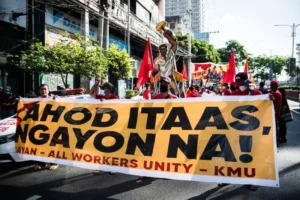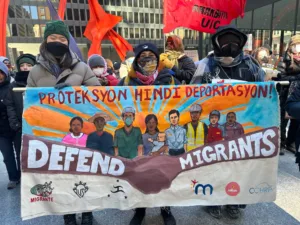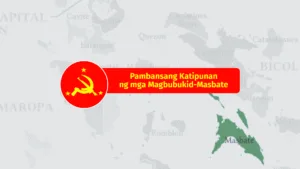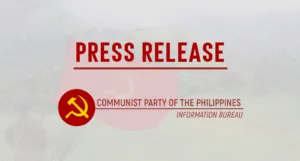In a media forum organized by Migrante International on July 19, victims of human trafficking in Cambodia condemned the Philippine government for injustice and neglect for their plight. The speakers at the media forum included Reverend Gerald of the united Methodist Church, Churches Witnessing With Migrants–Philippines, and former Gabriela Women’s Party representative and Anti-Trafficking in Persons Act principal author Liza Maza.
Migrante International and the families of ten workers forced to work in scam hubs previously held a press conference in Cambodia on April 21 to call for the victims’ repatriation and justice for their plight. The victims returned to the Philippines in April, June, and this July 15.
In the media forum, the victims reported their arrival in Cambodia, the harsh and inhumane treatment they suffered, their escape from the situation, and their pleas for the government’s help so they could return to the Philippines.
Most of the victims were recruited online to work as customer service representatives (CSR) in Cambodia with a promised salary of $700 per month. But upon arrival, their recruiters forced them to work in scam operations targeting Filipinos in the US.
The victims said employers physically assaulted and humiliated them if they refused to work. They also experienced torture and electrocution as the worst abuse. Employers sold “no longer useful” workers to other companies. The victims shared a story about two Indian coworkers who, after being tortured, were sent to be buried alive by the syndicate but managed to escape. Employers deducted their salaries whenever they made a mistake or fell asleep at work.
With the help of an Indian coworker, one of the victims managed to borrow a cellphone and request help so the Philippine embassy could rescue them.
Will, one of the victims, said his employer summoned and pressured him to identify the whistleblower. “He threatened to kill me in that room unless I confess. Then he made me strip—I thought they were going to electrocute me because they brought out an electrocution device. Failing to get anything from me, they locked me in a room. After several hours, the police arrived and took us to immigration,” he recounted.
They thought the police would take them to the Philippine Embassy. They were detained instead, while some ended up at the immigration office in Cambodia. They were later taken to the Removal Center where they were treated like criminals. They were ordered to lay on cardboard, had no water or food, lacked proper facilities, had limited communication with the outside world, and prohibited from going out. They stayed in those facilities for one to two months before returning home. There are other Filipinos currently detained in these facilities.
When they were finally able to ask the Philippine embassy for help, days passed before they received food and supplies like pillows, soap, and toothbrushes.
“On our way home, they brought us to the airport in handcuffs. We didn’t understand why we were handcuffed as we did not plan to escape but to go home,” Dennis said.
Upon arrival, some of the victims were told a government official will meet them but no one welcomed them at the Philippine airport. From their departure in Cambodia until their arrival in the Philippines, they were given only bread and water for food.
Tatay Ferdinand, who has a child rescued from the scam hub but still detained in Cambodia, also spoke at the press conference. He said the DMW has no plan to repatriate his child. On July 17, the Philippine embassy reportedly called his child to promise covering his food expenses, but gave no update on his repatriation. No embassy staff visits the victims in jail to check on their situation.
“Our government shows no compassion and has not insisted to the Cambodian government that our compatriots are victims. Our compatriots committed no crime but suffered prolonged detention. We clarify that no cases have been filed against them. There is no legal basis for their detention in Cambodia,” Migrante International vice chairperson Josie Pingkihan said.
“Does the Marcos government have no shame for its neglect of human trafficking victims? The Philippine embassy is very slow to provide food, water, and other essentials to the detained victims. They are even slower in processing their repatriation. What more for our demand for justice?” Pingkihan added.
Reverend Gerald also expressed solidarity and offered prayers, saying many suffer, lack education, and have inadequate wages due to the greed of a few. “A person loses his inherent dignity to enslavement. We appeal that Filipinos not be commodified. End the suffering, address the people’s needs.”
Liza Maza called for a congressional investigation into human trafficking in Cambodia. According to gathered information, some Bureau of Immigration officials are involved in the syndicate operating the scam hub.
“Our compatriots suffer three levels of victimization. First, they left the country because they were victims of poverty. Second, they fell victim to exploitation by recruiters and syndicates. Third, from government neglect—it provided no action, no medical assistance, and no financial support, despite our complaints.”
Victims and groups are calling on the Marcos regime for the immediate repatriation of all Filipinos in scam hubs, immediate transfer of Filipinos from Cambodian detention centers to halfway houses, financial and medical assistance for victims, and justice for all human trafficking victims.
Migrante and all its member organizations worldwide carry the call for justice for the victims in Cambodia in the upcoming mobilization during Marcos Jr’s State of the Nation Address on July 28.













